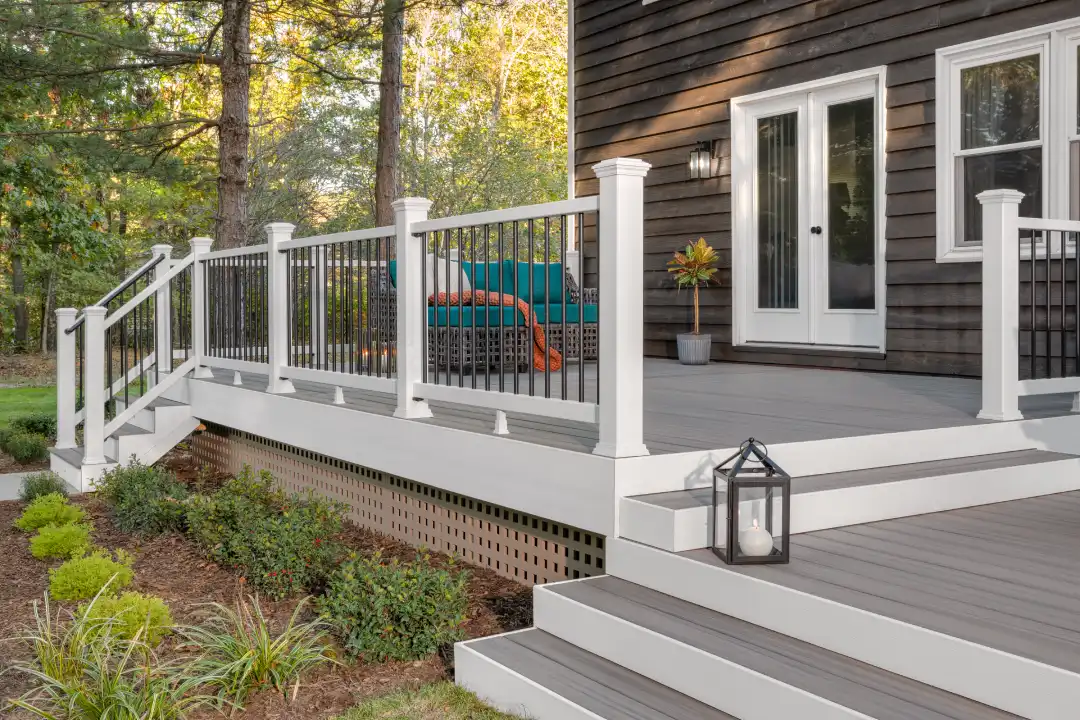When it comes to building or renovating a deck, one of the most important decisions you’ll make is choosing the right material. Two of the most popular options are Trex® composite decking and traditional wood decking. Both have their unique advantages, so how do you decide which is the best fit for your home?
In this guide, we’ll break down the key differences between Trex® and traditional wood decking to help you make an informed decision for your next outdoor project.
5 Key Things to Consider:
1. Durability
Trex® Composite Decking: Trex® is known for its exceptional durability. Made from a blend of recycled wood fibers and plastic, Trex® is resistant to fading, staining, scratching, and mold. It can withstand harsh weather conditions, including rain, snow, and intense sunlight, without warping or cracking. With Trex®, your deck will maintain its look for years with minimal wear and tear.
Traditional Wood Decking: Wood has a natural beauty that many homeowners love, but it’s more susceptible to damage. Over time, wood can warp, crack, or rot, especially in areas with high humidity or extreme temperatures. Without regular maintenance, it can also be prone to mold, mildew, and insect infestations.
The Bottom Line: If you’re looking for long-term durability with minimal upkeep, Trex® is the way to go.
2. Maintenance
Trex® Composite Decking: One of the biggest advantages of Trex® is its low maintenance. Unlike wood, Trex® never needs to be sanded, stained, or sealed. A simple wash with soap and water is all it takes to keep your Trex® deck looking fresh. This means you can spend more time enjoying your outdoor space and less time maintaining it.
Traditional Wood Decking: Wood decks, while beautiful, require regular maintenance to keep them in good condition. You’ll need to sand, stain, and seal your deck every 1-3 years to protect it from the elements. Without this care, wood can fade, splinter, or become damaged by moisture and insects.
The Bottom Line: If you prefer a low-maintenance option, Trex® will save you time and effort in the long run.
3. Aesthetics
Trex® Composite Decking: Trex® offers a wide variety of colors, textures, and finishes, giving you the flexibility to create a custom look for your deck. Whether you want the appearance of natural wood or something more modern, Trex® can mimic the style you’re going for. Plus, Trex® is designed to maintain its color without fading, so it’ll look great for years.
Traditional Wood Decking: Wood has a natural, timeless appeal that many homeowners find charming. Each board has unique grain patterns, and wood can be stained to achieve different shades and finishes. However, wood is more prone to fading, discoloration, and wear over time, meaning you’ll need to invest in regular maintenance to preserve its appearance.
The Bottom Line: Both options offer beautiful aesthetics, but Trex® is the winner if you want a deck that retains its look with minimal upkeep.
4. Environmental Impact
Trex® Composite Decking: Trex® is an environmentally friendly option, as it’s made from 95% recycled materials, including plastic bags and reclaimed wood. Choosing Trex® helps reduce the need for deforestation and cuts down on plastic waste. Trex® decks are also more sustainable in the long run, since they last longer and don’t need to be replaced as frequently as wood decks.
Traditional Wood Decking: Wood is a natural material, but harvesting it can contribute to deforestation and habitat destruction. However, if you choose sustainably sourced wood or opt for reclaimed wood decking, you can reduce the environmental impact of your deck. Wood is also biodegradable, which can be a plus for eco-conscious homeowners.
The Bottom Line: Trex® offers a greener alternative due to its use of recycled materials and longer lifespan.
5. Cost
Trex® Composite Decking: Trex® tends to have a higher upfront cost compared to traditional wood. However, when you factor in the reduced maintenance and long-lasting durability, Trex® can save you money in the long term by avoiding frequent repairs, refinishing, or replacement.
Traditional Wood Decking: Wood decking is often less expensive initially, making it an attractive option for homeowners on a budget. However, the cost of ongoing maintenance (staining, sealing, and repairs) adds up over time, potentially making wood more costly in the long run.
The Bottom Line: While wood may be cheaper upfront, Trex® offers better value over the lifespan of your deck.
Conclusion: Which Should You Choose?
Both Trex® and traditional wood decking have their pros and cons, but the choice ultimately depends on your preferences and needs.
- Choose Trex® if you want a durable, low-maintenance deck with a variety of color options and a long-term investment in mind.
- Choose Wood if you prefer the natural charm of real wood and don’t mind putting in the effort for regular maintenance.
Still not sure which material is right for you? Contact us at Tri-Cities Remodeling & Construction for expert advice and a free consultation! We’ll help you design the perfect deck that fits your lifestyle and budget.
Ready to start your deck project? Let’s turn your backyard into a stunning outdoor space you’ll love. Reach out today for a consultation! (423) 512-1993

